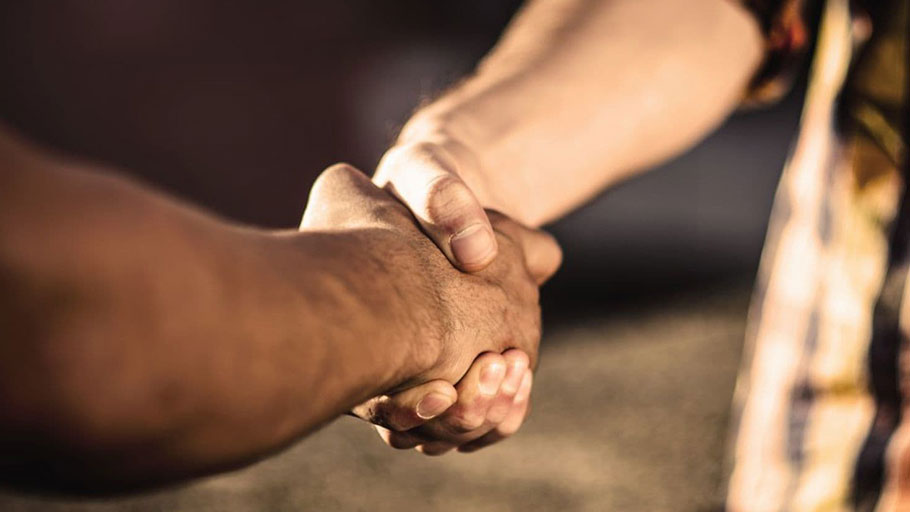By Marianne Williamson —
Years ago, I went with a doctor friend to see a charismatic Catholic priest, Father Ralph DiOrio. I had read his books on miraculous healing, and I was eager to see him in action.
The crowd, some in wheelchairs and others holding stricken children, poured by the thousands into a stadium in Sacramento. They were in search of physical healing.
“I wonder what I’m here to be healed from,” I remember thinking.
When DiOrio arrived, he bounded onto the stage, speaking excitedly about the miraculous power of God to heal all things. Almost immediately, he asked those of us who were not Roman Catholic to please stand.
I am Jewish. My friend is Jewish. Maybe 50 of us stood up. “Uh-oh,” I thought.
Yet what DiOrio did next was amazing. He didn’t ask the non-Catholics to confess our sins. He asked us to accept an apology. I remember him asking those who were Catholic to form a line in front of those who were standing, look into our eyes and say, “If I or my religion has ever done anything to hurt you or offend you or your religion, then please forgive me and please forgive us.”
Someone would say it, then someone after them, then someone after them. And thus began an emotionally stunning experience for me, as what seemed like hundreds of people lined up before me and apologized on behalf of the Catholic Church.
My father, a Jew raised in poverty toward the beginning of the 20th century, received a college education by the Catholics. And for the rest of his life he acknowledged his gratitude and respect. On a conscious level I certainly held no enmity toward the Catholic Church.
But as I received those apologies one by one, it felt as though an inverted cone opened above my head and my ancestors seemed to be looking down over it. I was accepting the apology for them. Tears streamed down my cheeks, and I left Sacramento wanting to extend to others the same healing of ancestral wounds.
I incorporated DiOrio’s apology prayers in my work, having men and women apologize to one another at couples’ retreats, Americans apologize to Native Americans, mainland Americans apologize to Hawaiians, and white Americans apologize to black Americans. I wrote in my book “Illuminata” about national atonement and apologies such as that made by Chancellor Roman Herzog of Germany in 1994, when he went to Warsaw and apologized for the Nazi slaughter of 500,000 Poles during World War II. I have continued to be fascinated by the emotional power of collective apologies.
Yet, the apology from whites to blacks seems to hit the deepest nerve. Prayerfully apologizing for the evils of slavery and the legacies of its horror while traveling around the country, from Detroit to Los Angeles to Richmond to New York to Houston, reactions from those who received the apology have ranged from “I have waited to hear those words my entire life!” to “That’s all you had to say.”
I recently received an email from an African American woman who said the apology offended her, but more than one person let out what seemed to be an ancestral scream at the end of the apology. I have seen too many instances of obvious healing to deny that for those who do feel it, the healing can run deep.
An apology does not constitute a true amends, and to truly heal our racial divide, we cannot stop there. Germany didn’t just apologize for the Holocaust; it has paid out $89 billion in reparations.
As we remember the 50th anniversary of Martin Luther King Jr.’s assassination on Wednesday, the issue of reparations for slavery should not be considered an outlandish idea. A national apology and a hundred-billion-dollar reparations plan, at the very least, represent a conversation worth having.
Reparations are not simply about money; they represent the acknowledgment of a wrong and a material effort to make it right. They are about dignity and respect. And perhaps, more than anything else, they’re an effort to interrupt a continuous pattern of economic, educational, social and political legacies of slavery that still exist.
Pope John Paul II apologized for sins of the Catholic Church, calling such an apology “an act of courage and humility in recognizing wrongs done.” But he also referred to such an apology as a “purification of memory,” without which the offending party would not necessarily realize ways that the sin continued to be perpetrated.
That, to me, is the fundamental issue that America has yet to face. In too many ways, legacies of slavery continue to be played out in our country through criminal, social and economic injustice. Until we do as a nation what as individuals we need to do to clean up past mistakes, we will be burdened by their continuance.
Because of fundamental efforts by Germany to make a full and total restitution — in the form of full mea culpa and reparations, yes, but also through a guarantee of Holocaust education to its children and to its children’s children — one gets a sense that with each succeeding generation of Germans, that nation sheds more and more of its karmic guilt.
Yet in America, 154 years after the end of the Civil War, each succeeding generation of Americans seems to inherit from its parents the toxicity of an unhealed relationship between blacks and whites. We do not adequately teach our children the racial history of America since the end of the Civil War, from the horrors of white supremacy and segregation and regular lynching and Jim Crow laws and voter suppression, to existing patterns of criminal injustice and the contemporary realities of mass incarceration.
It was a previous generation’s task to rid our country of slavery, and another generation’s task to pass civil rights legislation. While America ended the institution of slavery, its deeper work now is to end racism.
We must do more than heal on the level of legislation; we must heal on the level of the heart. It’s a whole lot easier to forgive someone who has had the courtesy to apologize. And easier still to forgive the thief who has at least tried to repay the money.
Until America has a robust conversation about both a national apology and the validity of reparations, we will continue to experience the emotional and political horrors of an unhealed relationship between blacks and whites.
Until then, I’ll continue to apologize on behalf of my country.
Marianne Williamson is a spiritual leader, New York Times #1 best selling author and lecturer. Her latest book is “Tears to Triumph,” about spirituality and depression. Details about her work can be found at marianne.com.















